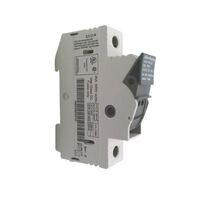Kingsgrove Branch:
Fuse Block

G'day! You've decided to kit out your 4WD or ute with all the good gear – a fridge, a UHF, some driving lights, maybe an inverter. Your first thought is to just run a heap of wires straight off the battery, each with its own dodgy little inline fuse.
Before you know it, your battery terminal looks like a proper bird's nest, you've got no idea what wire goes where, and it's a fair dinkum nightmare to find a fault. It's not just ugly, mate – it's unsafe.
There is a much, much better way to do it. If you want a schmick, professional, and safe 12V setup, you need a fuse block.
So, What is a Fuse Block, Exactly?
A fuse block (or 'fuse box') is the central distribution hub for your 12V power. Think of it as a mini switchboard for your 4WD, caravan, or tinnie.
Its job is simple: it takes one, large, main power cable from your battery and safely distributes that power to multiple, smaller accessories (like your fridge, lights, etc.), with each new circuit protected by its own individual, easy-to-find fuse.
The most common type you'll see in Australia is the blade fuse block, which uses the same standard, colour-coded plastic blade fuses that are in your car's main fuse box.
The Ripper Benefits: Why Bother with One?
Upgrading from a messy pile of inline fuses to a central fuse block is a no-brainer.
- It's Neat as a Pin: This is the big one. It turns that rat's nest of wiring into a clean, professional-looking installation. All your power wires run neatly to one spot.
- Massive Safety Boost: Instead of having unprotected wires all over the shop, every single circuit is properly fused and protected, right from the source. It massively reduces your fire risk.
- Easy Fault Finding (This is a Lifesaver!): If your spotlights stop working, you don't have to go hunting for a hidden inline fuse in the engine bay. You just pop the lid on the fuse block, look for the blown fuse (many modern blocks even have a little LED that lights up when a fuse is knackered!), swap it, and you're sorted in seconds.
- Simplifies Your Wiring: Many models come with a built-in 'negative busbar'. This means you can run all your negative (earth) wires back to the same block, keeping your whole setup incredibly tidy.
Where You'll Use This Ripper Bit of Kit
A fuse block is the non-negotiable heart of any good 12V build:
- 4WDs and Utes: For running dual-battery systems, fridges, compressors, UHF radios, and camp lighting.
- Caravans and Camper Trailers: For safely distributing power from the house battery to all the internal lights, water pumps, and 12V sockets.
- Boats and Tinnies: Essential for safely wiring up your fish finder, navigation lights, bilge pump, and radio.
- Custom Setups: Perfect for the back of your work van or in a portable battery box.
The CRITICAL Safety Warning: 12V vs. 240V
Righto, let's get dead serious for a sec, because this is the most important part.
- For 12V (DIY): Are you installing a fuse block for your 12V setup in the 4WD? Go for your life. As long as you use the right-sized cable, crimp your terminals properly, and put a big master fuse near the battery, it's a great and safe DIY job.
- For 240V Mains Power: The absolute second you are talking about your home's main fuse box (or switchboard), you MUST STOP.
In Australia, it is illegal and extremely dangerous for anyone other than a licensed electrician to perform any fixed 240V electrical wiring. Don't be a galah – it's just not worth the risk.
A Professional Job Needs Professional Gear
When a licensed electrician turns up to upgrade your old home fuse box, they're going to replace it with a modern, safe switchboard. They'll use high-quality, compliant circuit breakers and safety switches, all sourced from a trusted electrical wholesaler. They know that a professional job relies on professional gear, whether it's for 240V AC or 12V DC.
As one of Australia's most comprehensive electrical wholesaler and supplier networks, Schnap Electric Products stocks the lot. They not only provide all the 240V switchboard gear a qualified professional needs, but they also stock a massive range of high-quality 12V components, including robust, trade-quality fuse block units, heavy-duty cable, and crimp terminals for the serious automotive or marine installer. For a job that's safe, compliant, and built to last (whether it's on your house or your ute), the pros start with quality gear from a supplier like Schnap Electric.
Recent posts

Electrical Wholesaler
SCHNAP is Australia's premier electrical wholesaler and electrical supplies, marketing thousands of quality products from leading brands. Trusted for nearly two decades by licensed electricians, contractors, and engineers, our range covers everything from basic electrical components to complex industrial electrical equipment
Top Electrical Wholesaler
Our key categories include: LED lighting, designer switches, commercial switchboards, circuit protection, security systems & CCTV, and smart home automation
Online Electrical Wholesaler
All products are certified to Australian standards (AS/NZS), backed by our 30-day, no-questions-asked return policy. Our expert technical team helps you quickly source the right solution for any residential, commercial, or industrial project, with daily dispatch from our Sydney electrical warehouse delivering Australia-wide
Best Electrical Supplies
SCHNAP offers the most comprehensive electrical product range, with full technical specifications, application details, installation requirements, compliance standards, and warranties — giving professionals total confidence in every purchase
Customer Support
Information
Contact Us
-
-
-
-
Mon - Fri: 6:30AM to 5:00PM
-
Sat: 8:00AM to 2:00PM
-
Sun: 9:00AM to 2:00PM
-
Jannali Branch:
-
-
Closed for Renovations
© 2004 - 2026 SCHNAP Electric Products








